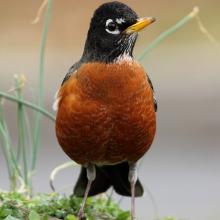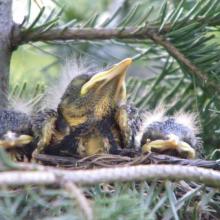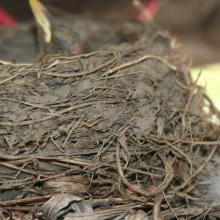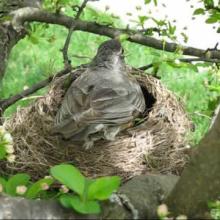

Join BirdNote tomorrow, November 30th!
Illustrator David Sibley and actor H. Jon Benjamin will face off in the bird illustration battle of the century during BirdNote's Year-end Celebration and Auction!
A bird with abnormal white feathers, like this American Robin, may have a genetic condition called leucism. Leucism prevents pigments from reaching some — or sometimes all — of a bird’s feathers. Albino birds are distinctly different and are entirely white with pink skin and eyes. Albinos have trouble making melanin, the pigment in skin, feathers, and eyes.
Did you know you can listen to BirdNote in your podcast app? Subscribe to BirdNote Daily and never miss an episode.
BirdNote®
Why Is My Robin Half White?
Written by Bob Sundstrom
Michael Stein: This is BirdNote.
Sometimes a real puzzler of a bird turns up. It might look like a regular robin, but with frosty white splotches on its head or back.
[American Robin]
Or within a flock of blackbirds, a single bird jumps out because it has white instead of black wings.
[Red-winged Blackbird]
What’s going on? The abnormal feathers on these birds are the result of a genetic condition called leucism, which prevents pigments from reaching some—or sometimes all—of a bird's feathers. The degree of leucism varies with a bird's genetic makeup. But the skin and eyes remain their normal pigment and color.
Albino birds are distinctly different. Albinos are entirely white with pink eyes and skin. Albinism has a different origin, too: problems with an enzyme called tyrosinase. Problems with tyrosinase lead to problems making melanin, the pigment that gives skin, feathers, and eyes their color.
You are much more likely to see a leucistic bird than an albinistic one. Keep an eye out for birds that have white patches or washed-out plumage. It could be a bird of any species. Find photos of a few on our website: BirdNote Dot Org.
I’m Michael Stein.
Did you know you can listen to BirdNote in your podcast app? Subscribe to BirdNote Daily and never miss an episode.
###
Bird sounds provided by The Macaulay Library of Natural Sounds at the Cornell Lab of Ornithology, Ithaca, New York. Recorded by Robert Bethel and Bob McGuire.
BirdNote’s theme music was composed and played by Nancy Rumbel and John Kessler.
Producer: John Kessler; Managing Producer: Jason Saul; Associate Producer: Ellen Blackstone
© 2018 Tune In to Nature.org May 2018/2019 January 2024
Narrator: Michael Stein
ID# leucism-01-2018-05-09 leucism-01
https://www.thespruce.com/bird-leucism-387342









